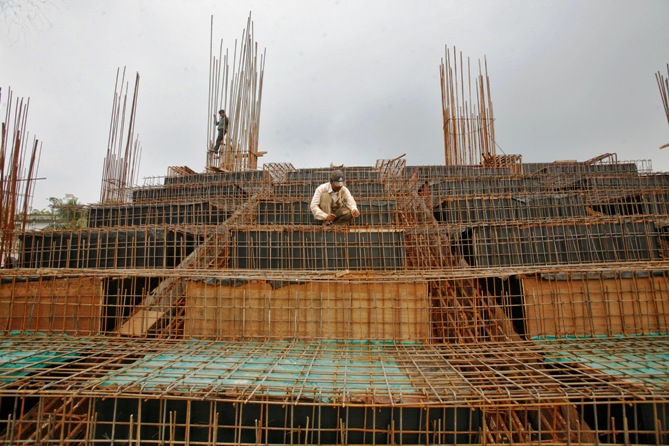 | « Back to article | Print this article |
Is 5% growth for India elusive in FY14?
Modest uptick in second quarter gross domestic product readings indicates that worst may be over for the domestic economy, but achieving government estimate of 5 per cent growth this fiscal may be an uphill task, a report by Singaporean brokerage firm DBS said on Monday.
"Underlying activity seems to have bottomed out, but the economy is not completely out of the woods.
"The modest uptick in the Q2 headline pace necessitates an upward revision in our annual estimate.
“But, it will still be an uphill task for growth to surmount the 5 per cent level this fiscal," the report said.
Click NEXT to read further. . .
Is 5% growth for India elusive in FY14?
As per the report, the government's estimate of 5-5.5 per cent GDP growth will require an average growth of 5.4 per cent in the second half of this fiscal, which is a tall order now.
"Therefore, full-year growth is likely to come in shy of the 5 per cent mark," the report said, adding any demand slow-down from western economies along with government's refocus on adherence to fiscal targets remain the key risks to higher growth in the second half of this fiscal.
Flagging concerns on impact of US tapering, the report said change in the US monetary policy stance and impact of higher US yields on leveraged domestic corporates need to be monitored closely.
"The RBI on its part will maintain a tight rein on the monetary policy as inflation and inflationary expectations remain elevated. We retain our call for another 25 basis points hike by March, 2014," the report said.
Click NEXT to read further. . .
Is 5% growth for India elusive in FY14?
On Friday, the government data showed that the economy fared better than expected, growing at 4.8 per cent in the second quarter.
In Q1, the same stood at 4.4 per cent, taking the overall growth in H1 to 4.6 per cent.
While manufacturing rose 1 per cent during the September quarter, agriculture output soared 4.6 per cent.
Exports during the quarter grew a robust 16.3 per cent on the back of rising global demand and fall in rupee.
On outlook for next fiscal, the report said it will be largely dictated by political developments and urgent need for revival in the capital expenditure cycle.
"A reform-centric and pro-growth agenda by the new government could emerge as an important catalyst for the business community and help kick-start the capex cycle," the report said.


